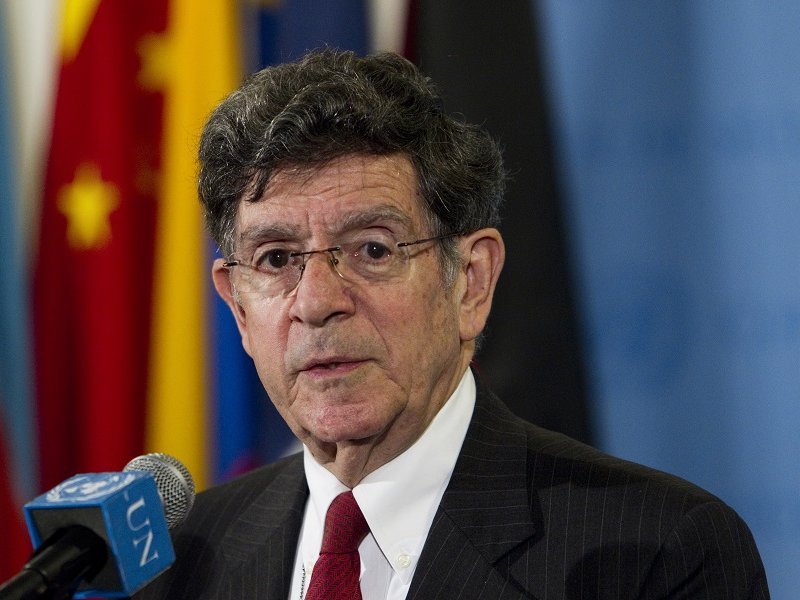In the past 10-15 years there has been considerable progress on building alliances between the United Nations and regional organizations, according to Gert Rosenthal, former minister of foreign affairs and former permanent representative of Guatemala to the UN.
Mr. Rosenthal said this development was in keeping with the vision clearly set out in the UN Charter, and the challenge now was to form partnerships in which all parties agreed on the delegation of duties and leadership.
“A clear example of this is the growing importance of the alliance between the United Nations Security Council and the Peace and Security Council of the African Union on how to relate to conflicts on the African continent,” he said.
Speaking with Andrea Ó Súilleabháin, Senior Policy Analyst at the International Peace Institute, Mr. Rosenthal said the multilateral system acts as a safeguard against global tensions evolving into conflicts and conflicts growing in scope.
“It’s a brake on conflict, I would say, and it also has the proactive role of promoting different initiatives on the part of member states, which point in the direction of compliance with the bigger goals of the UN Charter, the main one being to allow the world to have peaceful societies,” he said.
This discussion was part of a series of interviews done on the margins of the second retreat of the Independent Commission on Multilateralism, focused on social inclusion, political participation, and effective governance in challenging environments, and held on March 13-14.
Listen to interview:
The multilateral community of states is incredibly diverse, yet the United Nations Charter operates from a premise of universal values. How does this inherent tension affect the UN’s ability to fulfill its founding mission?
The UN Charter has certain values which all member states profess to abide by, which include the respect for human rights, to resolve conflicts peacefully, respect for freedom—maybe all states do not adhere to those principles, but at least they profess to adhere to them. But the main point of the United Nations, I think, is its universality. Belonging to the United Nations in itself bestows some legitimacy to states, and of course the states claim legitimacy to represent their own countries honoring the first line of the Preamble of the Charter, that they represent “we the peoples.”
In today’s changing landscape of conflict and political tensions in many states around the world, how does that affect the multilateral system?
Well, I think in the end, it’s a safeguard against tensions evolving into conflict and conflicts growing in scope. It’s a brake on conflict, I would say, and it also has the proactive role of promoting different initiatives on the part of member states, which point in the direction of compliance with the bigger goals of the UN Charter, the main one being to allow the world to have peaceful societies.
In this changing context, what is the role of regional organizations in linking the national level to the global?
Well, the Charter foresees an alliance or a partnership between the United Nations and regional organizations. The regional organizations are very diverse, they represent different interests, different memberships, different mandates, and many of them have activities that either overlap or even duplicate what the UN does. In that case the way to go—and the Charter sets this out very clearly—is for them to have a partnership whereby they agree on who does what, who exercises leadership. And a clear example of this is the growing importance of the alliance between the United Nations Security Council and the Peace and Security Council of the African Union on how to relate to conflicts on the African continent. So there are a lot of lessons learned in the last 10 or 15 years on how what the Charter says in letter really has been developed and practiced.
As you said earlier today, “Transnational issues such as organized crime and extremism continue to pose complex challenges for nations.” How can multilateralism provide effective solutions?
Certainly individual countries have proved unable, or unwilling maybe, but certainly unable to deal with these really intractable challenges. I can tell you from my own country, the transit of drugs for instance, from a drug-producing country to a drug-consuming country, in which geography put us in between as a transit point, has evolved into a major illicit activity, which has even infiltrated the democratic institutions of governance. So, you’re a bystander watching a process which seriously compromises democratic governance. That’s one country in one region—I could be talking of several countries in Latin America or in West Africa. We face a host of other challenges where individual states, especially small states, are unable to cope with them.
Thanks for speaking with us today.
All the best to you. Thank you.

